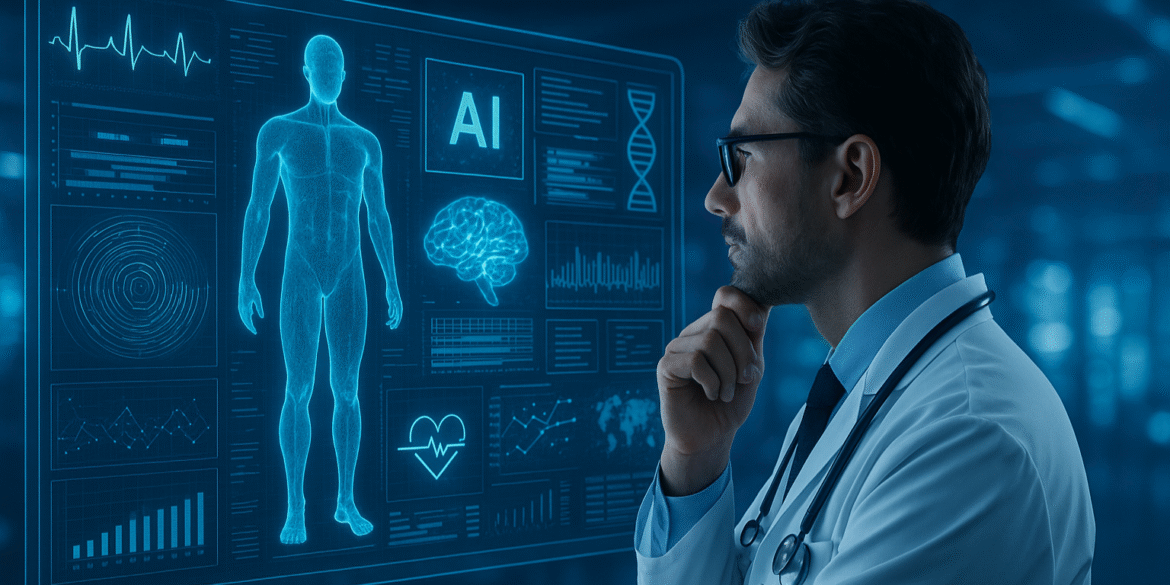Artificial Intelligence (AI) continues to revolutionize various industries, and healthcare is one of the most impacted sectors. As advancements in machine learning, predictive analytics, and personalized medicine accelerate, AI is poised to reshape how we approach patient care, diagnostics, and treatment efficiency. With 2025 on the horizon, here’s a look at the most promising AI innovations set to transform the future of healthcare.
AI-Powered Diagnostics: A Leap in Accuracy and Speed
One of the most exciting applications of AI in healthcare is its ability to assist in diagnostics. By analyzing vast amounts of medical data, AI algorithms can identify diseases earlier than traditional methods, often with greater accuracy.
AI in Radiology
Radiology has undergone significant transformation, with AI now assisting radiologists in interpreting medical images such as X-rays, CT scans, and MRIs. Companies like Zebra Medical Vision and Aidoc are leading the way in AI-powered tools that help doctors detect conditions such as tumors, fractures, and other abnormalities with remarkable precision.
For example, AI tools can flag potential problems in medical images within seconds, enabling radiologists to prioritize the most critical cases. This enhances diagnostic accuracy and speeds up treatment timelines, ultimately saving lives and reducing the strain on healthcare professionals.
Example: A 2020 study published in JAMA Network Open found that AI-driven algorithms outperformed radiologists in identifying certain types of lung cancer, showcasing the potential of AI in reducing human error and improving diagnostic outcomes.
Personalized Treatment Plans: AI as a Medical Consultant
AI is also revolutionizing how healthcare professionals tailor treatments to individual patients. Personalized medicine — which accounts for a patient’s unique genetic makeup, lifestyle, and environment — is becoming more accessible thanks to AI.
Using advanced predictive analytics, AI can process genetic data and other patient information to recommend the most effective treatment options. Tempus and IBM Watson Health are at the forefront, integrating AI with genomics and clinical data to provide physicians with personalized treatment insights.
This approach increases the likelihood of successful treatments and reduces adverse effects by offering therapies tailored to each patient’s genetic profile. In oncology, for instance, AI has been instrumental in identifying cancer treatments that are more likely to succeed based on the patient’s genetic mutations.
Example: In a recent trial, an AI-driven platform helped doctors select more effective treatments for breast cancer patients, improving patient outcomes significantly.
AI-Driven Drug Discovery: Accelerating Time-to-Market
Developing new drugs is typically a slow and costly process, often taking years and billions of dollars. AI is transforming this landscape by reducing the time spent on discovering new drugs, identifying potential candidates, and predicting their effectiveness.
For instance, AI systems can analyze existing chemical compounds and predict their interactions with diseases. This allows researchers to skip the early stages of trial and error, accelerating the process of finding viable drugs. Additionally, AI can scan large databases of medical research to identify promising therapeutic pathways.
Example: In 2020, Insilico Medicine utilized AI to design a novel drug for fibrosis in just 46 days — a process that would traditionally take years. This breakthrough demonstrates how AI can drastically shorten the time to market for new treatments.
AI in Virtual Healthcare: Enhancing Accessibility and Efficiency
Telemedicine has surged in popularity, especially after the COVID-19 pandemic, and AI is making virtual healthcare more efficient by offering tools like virtual health assistants and automated symptom checkers that can diagnose common ailments and suggest treatment options based on patient input.
AI Chatbots
AI-powered chatbots are now common in both hospital settings and private healthcare practices. For instance, Babylon Health uses AI to conduct consultations, offering medical advice and directing patients to specialists when necessary. These systems are particularly useful for managing chronic conditions, checking symptoms, and advising on lifestyle changes.
By automating many healthcare tasks, AI helps reduce the workload on medical staff, making healthcare services more efficient and accessible — especially in remote areas.
Example: Babylon Health’s AI-driven consultations have been used by millions of people globally, demonstrating how AI can improve healthcare access on a global scale.
AI and Predictive Analytics: Preventing the Next Health Crisis
AI-powered predictive analytics is another area showing immense promise. By analyzing trends in patient data, AI can predict outbreaks, identify at-risk populations, and forecast potential health crises, which could prevent widespread outbreaks and better prepare healthcare systems.
AI for Public Health Monitoring
AI algorithms can now analyze real-time data from hospitals, clinics, and public health organizations to identify emerging health trends. This technology is particularly beneficial in monitoring diseases like flu, COVID-19, and other potential health threats.
During the early stages of the COVID-19 pandemic, AI platforms helped track the virus’s spread, identify hotspots, and provide valuable data to public health officials, enabling more effective response strategies.
Example: AI’s role in tracking COVID-19 and forecasting potential outbreaks was critical in shaping the global response during the pandemic. Platforms developed by tech companies and public health organizations helped governments make data-driven decisions.
The Future: AI as the Cornerstone of Healthcare
Looking toward 2025 and beyond, the potential for AI in healthcare is vast. From improving patient outcomes to reducing operational costs, AI is setting the foundation for a more efficient and effective healthcare system.
As these technologies continue to evolve, challenges like data privacy, the ethical use of AI in decision-making, and concerns over job displacement in healthcare will need to be addressed. However, with proper regulation, AI has the potential to drastically improve care quality and alleviate pressure on overburdened healthcare systems worldwide.
Conclusion: A New Era for Healthcare
AI’s rapid advancements are undoubtedly reshaping the healthcare landscape. From improving diagnostics and personalizing treatments to accelerating drug discovery and enabling predictive analytics, AI is revolutionizing how healthcare is delivered. As we move forward into 2025, AI will continue to be a driving force in transforming the medical field, promising faster, more personalized, and cost-effective care for all.


